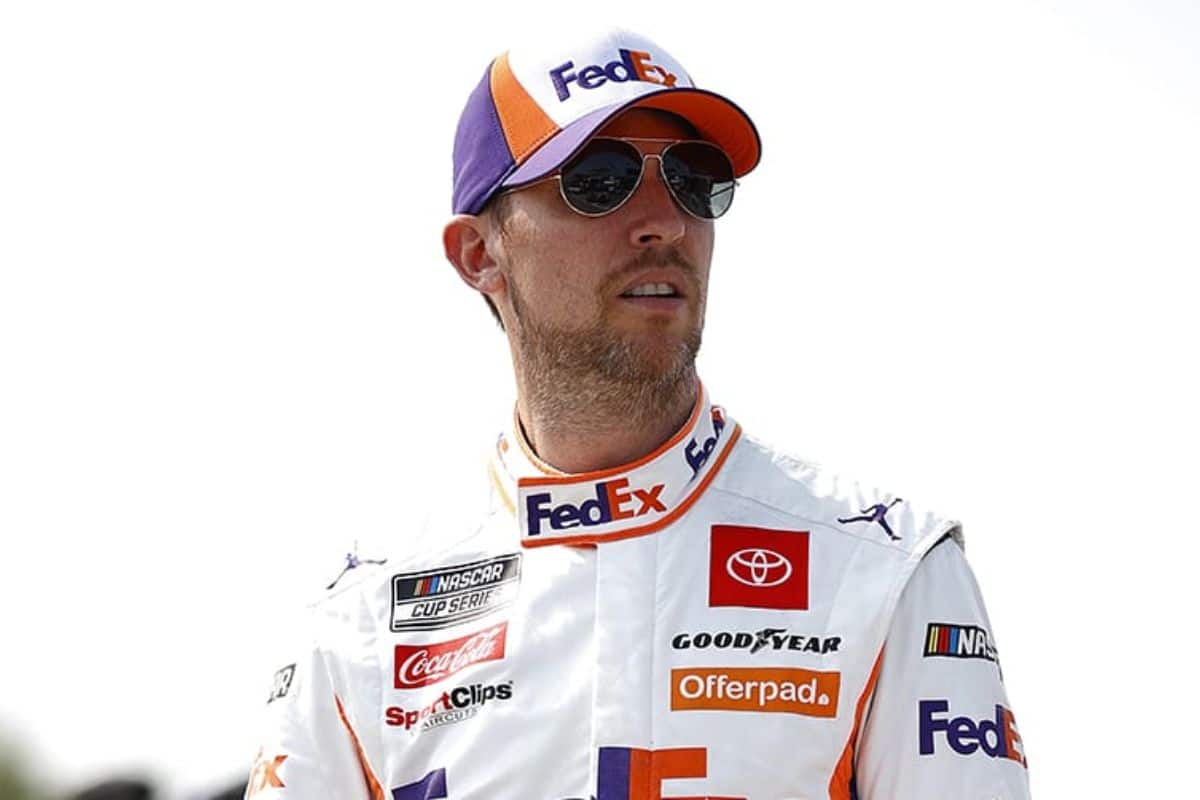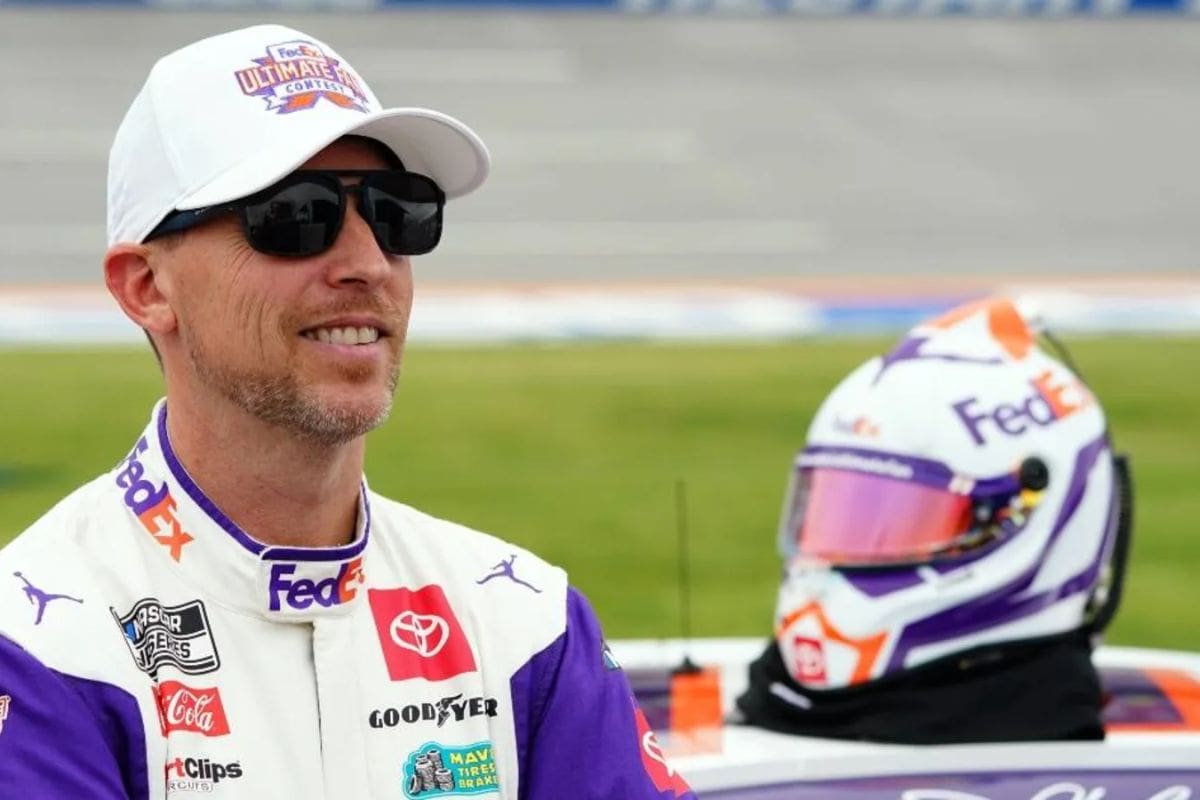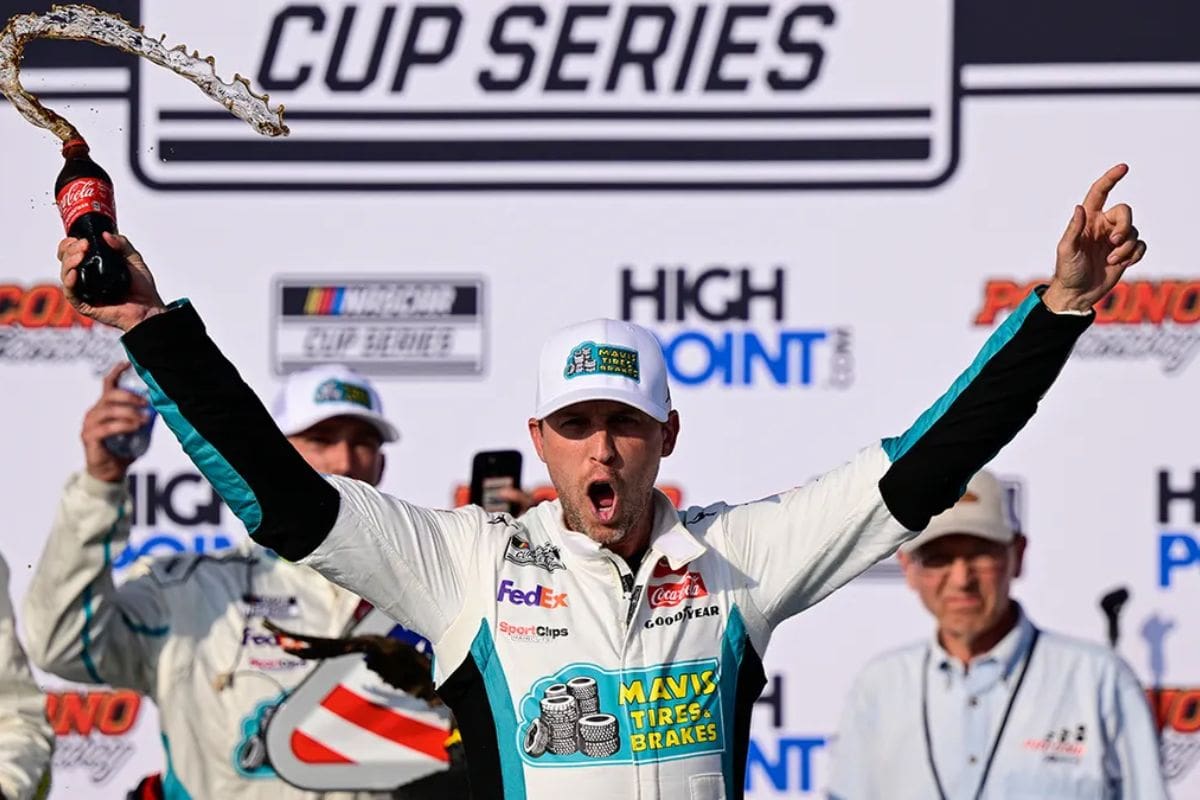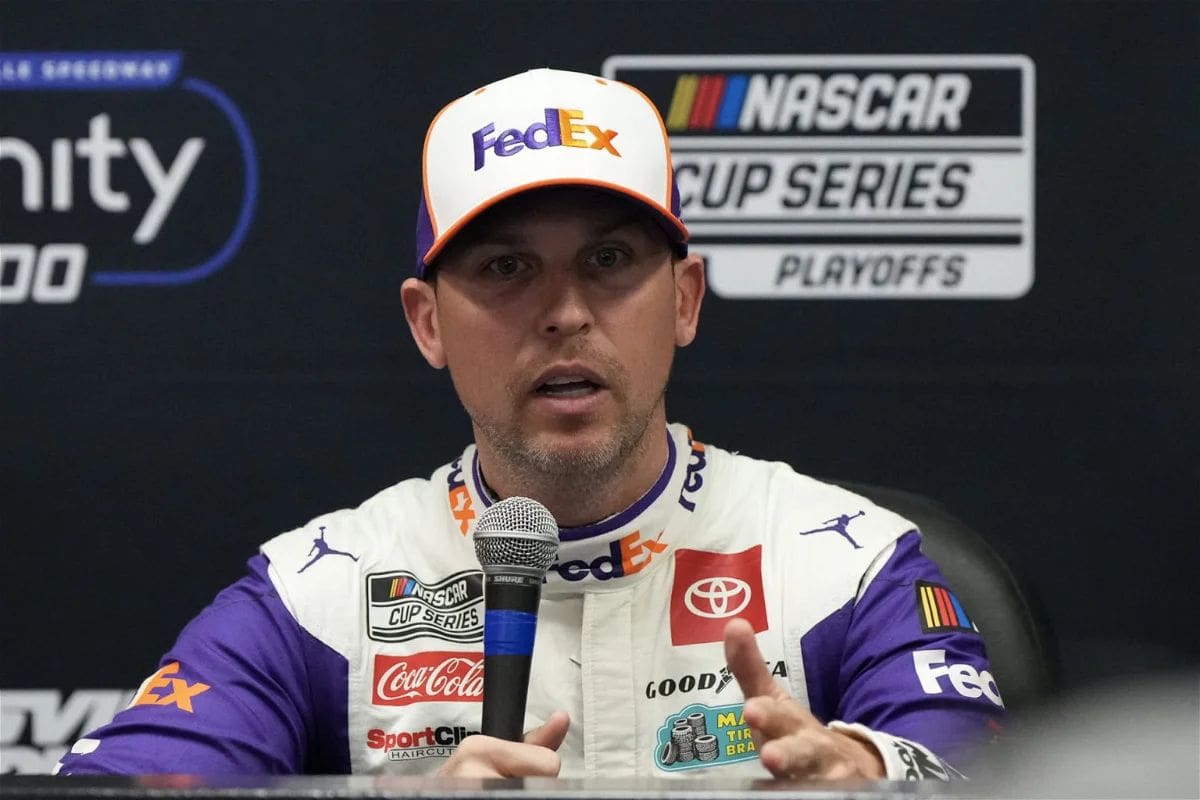NASCAR’s Ego Threatens Sport’s Future: Denny Hamlin‘s critique of NASCAR’s institutional ego raises significant questions about the sport’s future viability. By highlighting the organization’s bureaucratic inefficiencies and hypersensitivity to external criticism, Hamlin suggests that NASCAR’s resistance to change may impede its ability to adapt to modern challenges. This rigidity, he argues, could stifle innovation and alienate all the drivers and fans. Hamlin’s concerns prompt a deeper examination of how NASCAR’s current approach to governance and feedback might be reorganized to guarantee long-term sustainability and growth in an increasingly competitive motorsports environment.
Key Highlights
- Hamlin criticizes NASCAR’s rigidity and resistance to change, risking the sport’s adaptation to contemporary challenges.
- He warns that NASCAR’s bureaucratic inefficiencies and delayed decisions, like in Kyle Larson’s case, harm driver morale and public image.
- Hamlin emphasizes NASCAR’s ‘take it or leave it’ mentality could threaten the sport’s future by stifling innovation and dialogue.
- He believes NASCAR’s overly cautious governance erodes driver confidence and alienates valuable feedback from the driving community.
- Hamlin points out that lack of trust and cooperation between drivers, teams, and officials threatens the sport’s ability to evolve and succeed.
Denny Hamlin’s Critique of NASCAR
Denny Hamlin’s continual criticisms of NASCAR highlight a consistent tension between the driver’s outspoken nature and the organization’s governance strategies. Hamlin, a prominent figure in the Cup Series, has never shied away from voicing his concerns, often targeting NASCAR’s decision-making processes and operational methodologies. This pattern of public dissent emphasizes a broader issue within the sport: the clash between individual expression and institutional control.
Hamlin’s critiques are not merely superficial grievances but are rooted in a deeper dissatisfaction with how NASCAR handles different aspects of the sport. His comments often point to a perceived rigidity within the governing body, suggesting that NASCAR’s adherence to traditional methods may stifle innovation and adaptability. By publicly challenging NASCAR, Hamlin positions himself as a vocal demand for change, highlighting the need for the sport to evolve in response to contemporary challenges and opportunities.
This dynamic creates a duality in Hamlin’s relationship with NASCAR. While his popularity and success on the track make him a valuable asset to the sport, his forthrightness introduces friction. The sweet and sour nature of this relationship is indicative of a broader struggle between maintaining the integrity of the sport and embracing progressive reforms. Hamlin’s stance urges NASCAR to reconsider its approach, balancing respect for its storied history with the necessity for modernization.

Denny Hamlin’s Warning to NASCAR Using Kyle Larson’s Example
Hamlin’s concerns about NASCAR’s governance are further exemplified through his use of Kyle Larson’s recent experience with The Double to caution the organization about the consequences of its actions. When Larson attempted The Double—a daring endeavor of competing in both the Indianapolis 500 and the Coca-Cola 600 in one day—he was met with bureaucratic obstacles. Although NASCAR’s rules mandate that drivers must start all Cup Series events, Larson applied for a waiver, a procedure typically granted by the governing body.
“I feel as though for many years and this kind of goes into the Larson thing as well. NASCAR has felt like the show will go on with or without you. I don’t know that that is necessarily as true today as it used to be.” – (hamlin)
NASCAR’s procrastination in granting this waiver serves as a pertinent example of the organization’s cumbersome decision-making process. Hamlin argues that such delays not only reduce the drivers but also tarnish the sport’s reputation and future prospects. Indeed, Larson’s eligibility for the playoffs was eventually confirmed, but the delay brought unnecessary stress and uncertainty.
There are always superstars coming in and out. We had a lot of young talent coming through the roots and it’s just sponsorship was all plentiful and it was all always like when you didn’t do what they wanted you to do, it was take it or leave it and this is our show, our sandbox and if you don’t like it, get out and the show’s going to run on this weekend.” – (hamlin)
- Delayed Waiver Decisions: The slow response in Larson’s case highlights a tendency for NASCAR to drag its feet on administrative decisions that could be expedited to support driver ambitions and improve the sport’s appeal.
- Impact on Driver Morale: Prolonged uncertainty can demoralize drivers, affecting their performance and willingness to engage in high-profile events that raise the sport’s stature.
- Public Perception: Such bureaucratic inefficiencies can damage NASCAR’s public image, making it appear as an organization resistant to change and unsupportive of its athletes’ ambitions.
Denny Hamlin takes a 4 point lead after Gateway. #NASCAR #WinstonCup pic.twitter.com/tWapRgA9Vy
— NASCAR Winston Cup Series Standings (@NWCS_Standings) June 2, 2024
Denny Hamlin’s Criticism of NASCAR’s Approach and Handling
Criticizing NASCAR’s entrenched approach, the veteran driver highlighted the organization’s refusal to adapt to a changing landscape. Denny Hamlin expressed concerns over NASCAR’s longstanding ‘take it or leave it’ mentality, suggesting that this rigid stance is increasingly out of touch with the current dynamics of the sport.
Hamlin’s critique emphasizes a significant issue: the sport’s governing body has historically operated under the assumption that the show would go on regardless of individual participants or evolving circumstances.
“I don’t think you can treat [like] that, our sport is not like that anymore. And if you ruffle the feathers of a Chase Elliott or a Kyle Larson now, you got a team that says ‘Alright you want it to go on without us, we’re out.’” – (hamlin)
Hamlin’s pointed remarks come with a sense of urgency, as he believes that NASCAR’s inflexibility could threaten its future. He illustrated his concerns by referencing the cases of Kyle Larson and Chase Elliott. These drivers represent a new breed of talent whose presence and performance are crucial to maintaining fan engagement and the sport’s general well-being. Hamlin implied that NASCAR’s unwillingness to accommodate or support its drivers more adaptively might alienate key figures and, by extension, their fan bases.
“I just feel as though these are the kind of things that knock out the leg of your stool and it just if you keep having these things that show splinters it just is never, it’s not good for the sport long term. And I want to see what’s good for the sport.” – (hamlin)
Moreover, Hamlin’s observations suggest that NASCAR’s current approach fails to recognize the shifting expectations of all the drivers and audiences. In a world where sports entertainment is rapidly evolving, the notion that the sport can thrive purely on its historical prestige is increasingly challenged.

Denny Hamlin’s Critique of NASCAR’s Sensitivity
Frequently outspoken, veteran driver Denny Hamlin has recently highlighted NASCAR’s sensitivity, criticizing the organization’s overly cautious and sometimes inconsistent approach to governance. Hamlin’s critique revolves around what he sees as an overly delicate handling of situations, leading to policies that appear reactive rather than proactive. His comments emphasize a growing concern within the racing community about the sport’s ability to maintain its integrity and competitive spirit amidst fluctuating and sometimes confusing regulations.
“I need to think carefully about how I word this, and it isn’t going to (come across right) for sure, but I feel as though they get offended very easily. They are very sensitive people.” – (hamlin)
Hamlin points to several instances where NASCAR’s decisions have been met with skepticism, suggesting that the governing body is more focused on optics than on fostering fair competition. This sensitivity, according to Hamlin, not only erodes the confidence of drivers but also impacts the sport’s credibility with fans and stakeholders. He stresses the need for NASCAR to adopt a more robust and consistent framework for decision-making.
“They believe they are the show in the U.S. and if you participate in NASCAR, you shouldn’t participate in anything else…and I just think they don’t like playing second fiddle to anyone. There is someone in NASCAR headquarters that doesn’t like being second fiddle and believes if you’re going to be over here, you need to be over here, and you’re ours now.” – (hamlin)
- Kyle Larson’s Waiver: Hamlin criticized NASCAR for being too controversial in granting a waiver to Larson, implying that such decisions are motivated more by public relations concerns than by clear, established rules.
- Inconsistent Penalties: The varying severity of penalties for similar infractions has further fueled Hamlin’s argument that NASCAR’s approach lacks coherence and predictability.
- Response to Driver Feedback: Hamlin has observed that NASCAR’s sensitivity sometimes leads to dismissing valuable feedback from drivers, which could otherwise contribute to more balanced and effective governance.
Denny Hamlin’s Concerns
Many within the racing community share Denny Hamlin’s apprehensions about NASCAR’s current trajectory. Hamlin’s concerns center around the governing body’s perceived hypersensitivity to criticism, which he suggests could be alienating some of its most valuable stakeholders—its top teams and drivers.
His pointed remarks question whether NASCAR’s leadership is fostering an environment conducive to the sport’s long-term success or if it is accidentally stifling the voices that could drive meaningful progress.
Hamlin’s critique implies that NASCAR’s current approach could be detrimental to its core. The sport thrives on the competitive spirit and openness of its participants, attributes that not only entertain fans but also push the boundaries of racing excellence.
By silencing analysis or reacting defensively to constructive criticism, NASCAR risks creating a homogenized environment where innovation and robust dialogue are stifled. This, in turn, could lead to stagnation, with regard to on-track performance and off-track engagement with the fanbase.
Moreover, Hamlin’s perspective suggests that the governing body’s ego might be overshadowing the crucial feedback loop between drivers, teams, and NASCAR officials. When the sport’s most prominent figures feel marginalized or unheard, the disconnect could erode trust and cooperation, critical components for adapting to the evolving landscape of motorsports.

News in Brief: NASCAR’s Ego Threatens Sport’s Future
Denny Hamlin’s critique emphasizes the importance for NASCAR to balance tradition with modernization and flexibility. Highlighting the risks posed by bureaucratic inefficiencies, delayed decisions, and hypersensitivity to criticism, Hamlin points out the necessity for open dialogue and adaptability.
Addressing these concerns is vital for ensuring NASCAR’s long-term success in a dynamic motorsports landscape. The call to action is clear: evolve or face potential stagnation, thereby threatening the sport’s future viability and relevance.
Our Reader’s Queries
Q: Is Denny Hamlin a NASCAR owner?
A: Denny Hamlin drives the No. 11 Toyota for Joe Gibbs Racing and co-owns 23XI Racing with NBA legend Michael Jordan in the NASCAR Cup Series. Throughout his career, he has amassed 54 wins, including notable triumphs in the Coca-Cola 600 (2022), Daytona 500 (2016, 2019, 2020), and Southern 500 (2010, 2017, 2021).
Q: Does Denny Hamlin still race in NASCAR?
A: James Dennis Alan Hamlin (born November 18, 1980) is an American professional stock car racing driver and team owner. He competes full-time in the NASCAR Cup Series, driving the No. 11 Toyota Camry XSE for Joe Gibbs Racing. Additionally, he co-owns and operates 23XI Racing with basketball Hall of Famer Michael Jordan.
Also Read: Denny Hamlin Names Bell Championship Favorite After Gateway

